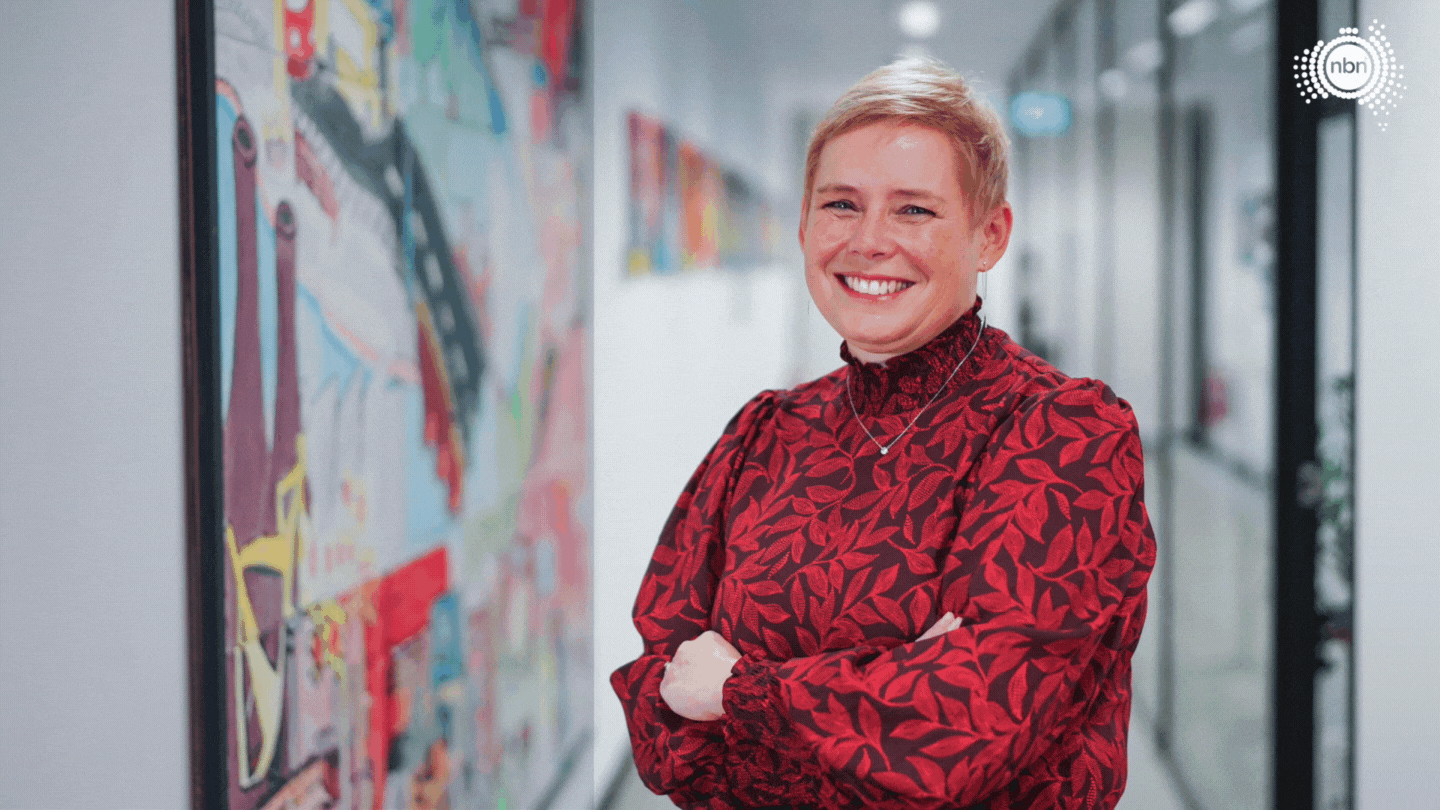
Making their mark: female leaders at nbn
At nbn, our people are central to delivering the company’s purpose of helping to lift the digital capability of Australia – and our female leaders, currently making up more than 32 per cent of management roles across the company, are pivotal.
Firmly embracing our values of We Care, We are Fearless, We are One Team and We Deliver, leaders – including Jo Dutton, Engy Yousef and Angie Kerle – are proving nbn is a great place to continue building leadership strengths.
And as we work towards lifting female representation in management to 40 per cent by 2025, we’re ensuring greater gender equality across nbn’s leadership and are committed to supporting even more great leaders like them.
Leading in IT
Meet Jo Dutton
It was nbn’s purpose of lifting the digital capability of Australia that piqued Jo Dutton’s interest and would see her move from the Midlands of England to take up a role in Melbourne.
“I thought the premise of nbn, which was trying to connect the whole of a continent and really not leave anyone behind, was really interesting as an engineering challenge,” says Jo.
With a PhD in Physics, the self-confessed geek had been working in telecommunications for more than 20 years, both as a management consultant and in roles at operators in Europe.
“The role itself was enticing because it was a combination of network technology skills and IT technology skills. And, as you look at the future of telco with software defined networking and network virtualisation, that was a great combination to have a role that had both those accountabilities.”
Now, as Executive General Manager for Technology Transformation within nbn’s Systems Engineering and Operations Group, Jo’s role is all about strategy and transformation of the technology.

As a female leader working in a traditionally male-dominated industry for two decades, Jo has experienced more than her fair share of gender-related challenges.
When she was made a senior manager in a previous organisation – as Director of Hybrid Fibre Coaxial (HFC) and Customer Premises Equipment Engineering – she fielded a surprising question from a male vendor.
“I introduced myself and he went, ‘Do you need us to explain what the HFC is to you and what all this means?’
“And I was like, ‘No, you're okay. I have a PhD in Physics so, you know, I've got this job on merit. I actually understand the space.’
“A male would never have been asked that question and have had to deal with that.”
At nbn, we consciously create and maintain an inclusive environment where all our people feel empowered, safe, respected, have a sense of belonging and can thrive and succeed.
Finding her voice
Over her career, says Jo, the biggest journey has been finding her – often sole female – voice and realising its value.
It’s that diversity of thought that Jo wholeheartedly believes in for her team and the business.
“I fundamentally believe that we get better solutions and better outcomes if we have diverse perspectives looking at a problem – and the research backs it up.
“You can go and see paper after paper after paper that proves a diverse team will outperform a team of A-types every single time.
“And, for me, things like gender diversity, accessibility and inclusion, graduates, age profiles, they’re proxies for bringing that diversity in so that you get all those different perspectives, and you get those really good answers to the things that you're trying to solve for.”
It’s exactly why, at nbn, we foster a diverse, equitable and inclusive culture to collaborate and innovate as an organisation and develop better solutions for our customers, partners and the communities we operate within, and ultimately lift the digital capability of Australia.
“We should represent the communities we serve,” says Jo.
“How can we know what our customers and communities want if we don't represent who they are and what they look like?”
And, on that point, Jo is keen to see more women in roles across the organisation.
“When I think about the technology space, in Western cultures in particular, we don't have enough women going into these careers and we have a massive skills shortage in Australia (estimated to be 180,000 by 2030) – so, you're missing out on almost 50 per cent of your potential pool of talent.
“Tech is such a rewarding, diverse, exciting career, I think it's a real shame that women in particular are missing out on these great opportunities.
“As a female leader, that role modelling is super important because you have to see people there to believe that you can be there as well.”
To this end, at nbn, we are working with industry to encourage girls and young women into considering careers in Science, Technology, Engineering and Mathematics (STEM).
We’re also focused on retaining female talent across nbn through an inhouse sponsorship program, which spans across eight months. We are currently in our fourth year of delivering this talent program, with another 20 females nominated in the last year by their business units to build connections, their profile, networks and most importantly sponsorship opportunities with senior leaders across nbn.
On women in management, Jo simply says she wants more – and sometimes they may need a nudge to get there.
“I'd just like to see more, and we all have the responsibility for encouraging it.
“Understand that you might need to go and tap a really good female candidate on the shoulder if you want them to apply for a role, we probably need to sponsor more and be even more active if we want to see female progression into those leadership roles.”
Jo’s tips for aspiring leaders
- Absolutely believe that you can do it.
- Understand and be empathetic to the differences in people.
- Don't feel that you need to have or mimic gender specific traits to be successful – be your authentic self.


